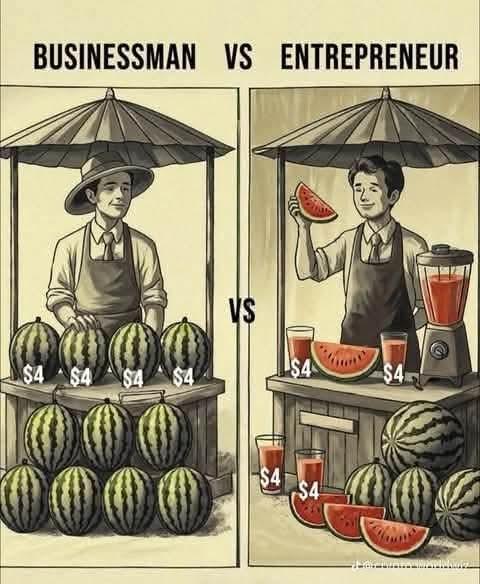The Difference Between a Businessman and an Entrepreneur
The terms "businessman" and "entrepreneur" are often used interchangeably, but they represent distinct ideas and mindsets. Let's break down the key differences between the two:
1. Definition and Focus
- Businessman: A businessman is typically someone involved in commercial activities, primarily focused on managing established businesses. Their main responsibility revolves around handling resources, boosting profits, and adhering to proven business models.
- Entrepreneur: In contrast, an entrepreneur is someone who identifies opportunities and takes the initiative to create new ventures or improve existing ones. Their focus is on innovation, taking calculated risks, and turning ideas into successful businesses or products.
2. Risk Attitude
- Businessman: Businessmen generally adopt a more cautious approach to risk, preferring stable, established markets and optimizing existing processes rather than venturing into uncharted territory.
- Entrepreneur: Entrepreneurs, on the other hand, are often more willing to take risks as they strive to create something new or disrupt existing markets. They're frequently prepared to take calculated risks to pursue innovative ideas.
3. Innovation vs. Management
- Businessman: While businessmen may implement improvements, their primary role is often centered on effective management and operational efficiency within existing structures. They typically focus on sustaining and growing the business through conventional methods.
- Entrepreneur: Entrepreneurs are often viewed as innovators, driven by a desire to address problems or fulfill unmet needs in the market. They prioritize creativity and innovation to develop new solutions.
4. Vision vs. Execution
- Businessman: A businessman usually operates within a predefined vision or framework, focusing on executing that vision effectively. They may not be the ones who conceived the original business idea, but they play a crucial role in ensuring the business runs smoothly and profitably.
- Entrepreneur: Entrepreneurs, in contrast, often develop their own vision and take charge of turning it into a reality. They actively steer their businesses and make key decisions that can influence the entire industry.
5. Motivation
- Businessman: For many businessmen, the driving force comes from achieving financial success and stability. Their primary objectives often revolve around generating profits, increasing market share, and maintaining a competitive edge.
- Entrepreneur: While entrepreneurs also strive for financial success, their motivations often run deeper. They may be driven by a passion for their ideas, a desire to make a difference, or a commitment to social change. Their goals can include personal fulfillment or addressing societal challenges.
6. Growth Orientation
- Businessman: Businessmen typically concentrate on steady growth within their established markets, optimizing operations to ensure ongoing success. Their strategies often involve gradual scaling and adhering to proven methods.
- Entrepreneur: Entrepreneurs, on the other hand, usually set their sights on rapid growth and scalability, constantly seeking ways to disrupt industries and expand into new markets. They're often quick to adjust their strategies based on market feedback.
In summary, while both businessmen and entrepreneurs are vital to the economy, their approaches, mindsets, and definitions are distinct. Businessmen tend to focus on managing established companies and optimizing for success, whereas entrepreneurs prioritize innovation and risk-taking to create new ventures or transform existing ones. Recognizing these differences can provide insight into the various ways individuals contribute to economic growth and progress.
Thanks for reading.
"Live Purposefully"
The terms "businessman" and "entrepreneur" are often used interchangeably, but they represent distinct ideas and mindsets. Let's break down the key differences between the two:
1. Definition and Focus
- Businessman: A businessman is typically someone involved in commercial activities, primarily focused on managing established businesses. Their main responsibility revolves around handling resources, boosting profits, and adhering to proven business models.
- Entrepreneur: In contrast, an entrepreneur is someone who identifies opportunities and takes the initiative to create new ventures or improve existing ones. Their focus is on innovation, taking calculated risks, and turning ideas into successful businesses or products.
2. Risk Attitude
- Businessman: Businessmen generally adopt a more cautious approach to risk, preferring stable, established markets and optimizing existing processes rather than venturing into uncharted territory.
- Entrepreneur: Entrepreneurs, on the other hand, are often more willing to take risks as they strive to create something new or disrupt existing markets. They're frequently prepared to take calculated risks to pursue innovative ideas.
3. Innovation vs. Management
- Businessman: While businessmen may implement improvements, their primary role is often centered on effective management and operational efficiency within existing structures. They typically focus on sustaining and growing the business through conventional methods.
- Entrepreneur: Entrepreneurs are often viewed as innovators, driven by a desire to address problems or fulfill unmet needs in the market. They prioritize creativity and innovation to develop new solutions.
4. Vision vs. Execution
- Businessman: A businessman usually operates within a predefined vision or framework, focusing on executing that vision effectively. They may not be the ones who conceived the original business idea, but they play a crucial role in ensuring the business runs smoothly and profitably.
- Entrepreneur: Entrepreneurs, in contrast, often develop their own vision and take charge of turning it into a reality. They actively steer their businesses and make key decisions that can influence the entire industry.
5. Motivation
- Businessman: For many businessmen, the driving force comes from achieving financial success and stability. Their primary objectives often revolve around generating profits, increasing market share, and maintaining a competitive edge.
- Entrepreneur: While entrepreneurs also strive for financial success, their motivations often run deeper. They may be driven by a passion for their ideas, a desire to make a difference, or a commitment to social change. Their goals can include personal fulfillment or addressing societal challenges.
6. Growth Orientation
- Businessman: Businessmen typically concentrate on steady growth within their established markets, optimizing operations to ensure ongoing success. Their strategies often involve gradual scaling and adhering to proven methods.
- Entrepreneur: Entrepreneurs, on the other hand, usually set their sights on rapid growth and scalability, constantly seeking ways to disrupt industries and expand into new markets. They're often quick to adjust their strategies based on market feedback.
In summary, while both businessmen and entrepreneurs are vital to the economy, their approaches, mindsets, and definitions are distinct. Businessmen tend to focus on managing established companies and optimizing for success, whereas entrepreneurs prioritize innovation and risk-taking to create new ventures or transform existing ones. Recognizing these differences can provide insight into the various ways individuals contribute to economic growth and progress.
Thanks for reading.
"Live Purposefully"
The Difference Between a Businessman and an Entrepreneur
The terms "businessman" and "entrepreneur" are often used interchangeably, but they represent distinct ideas and mindsets. Let's break down the key differences between the two:
1. Definition and Focus
- Businessman: A businessman is typically someone involved in commercial activities, primarily focused on managing established businesses. Their main responsibility revolves around handling resources, boosting profits, and adhering to proven business models.
- Entrepreneur: In contrast, an entrepreneur is someone who identifies opportunities and takes the initiative to create new ventures or improve existing ones. Their focus is on innovation, taking calculated risks, and turning ideas into successful businesses or products.
2. Risk Attitude
- Businessman: Businessmen generally adopt a more cautious approach to risk, preferring stable, established markets and optimizing existing processes rather than venturing into uncharted territory.
- Entrepreneur: Entrepreneurs, on the other hand, are often more willing to take risks as they strive to create something new or disrupt existing markets. They're frequently prepared to take calculated risks to pursue innovative ideas.
3. Innovation vs. Management
- Businessman: While businessmen may implement improvements, their primary role is often centered on effective management and operational efficiency within existing structures. They typically focus on sustaining and growing the business through conventional methods.
- Entrepreneur: Entrepreneurs are often viewed as innovators, driven by a desire to address problems or fulfill unmet needs in the market. They prioritize creativity and innovation to develop new solutions.
4. Vision vs. Execution
- Businessman: A businessman usually operates within a predefined vision or framework, focusing on executing that vision effectively. They may not be the ones who conceived the original business idea, but they play a crucial role in ensuring the business runs smoothly and profitably.
- Entrepreneur: Entrepreneurs, in contrast, often develop their own vision and take charge of turning it into a reality. They actively steer their businesses and make key decisions that can influence the entire industry.
5. Motivation
- Businessman: For many businessmen, the driving force comes from achieving financial success and stability. Their primary objectives often revolve around generating profits, increasing market share, and maintaining a competitive edge.
- Entrepreneur: While entrepreneurs also strive for financial success, their motivations often run deeper. They may be driven by a passion for their ideas, a desire to make a difference, or a commitment to social change. Their goals can include personal fulfillment or addressing societal challenges.
6. Growth Orientation
- Businessman: Businessmen typically concentrate on steady growth within their established markets, optimizing operations to ensure ongoing success. Their strategies often involve gradual scaling and adhering to proven methods.
- Entrepreneur: Entrepreneurs, on the other hand, usually set their sights on rapid growth and scalability, constantly seeking ways to disrupt industries and expand into new markets. They're often quick to adjust their strategies based on market feedback.
In summary, while both businessmen and entrepreneurs are vital to the economy, their approaches, mindsets, and definitions are distinct. Businessmen tend to focus on managing established companies and optimizing for success, whereas entrepreneurs prioritize innovation and risk-taking to create new ventures or transform existing ones. Recognizing these differences can provide insight into the various ways individuals contribute to economic growth and progress.
Thanks for reading.
"Live Purposefully"













